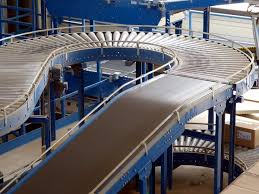In the modern industrial landscape, Industrial Conveyor Belts play a crucial role in optimizing operations across various industries. These belts are integral to material handling, ensuring efficient movement of goods within manufacturing units, warehouses, and distribution centers. Whether in mining, food processing, or packaging, conveyor belts enhance productivity, reduce manual labor, and streamline processes. In this article, we delve into the different types of Industrial Conveyor Belts, their applications, and the benefits they offer to various industries.
Types of Industrial Conveyor Belts
Industrial Conveyor Belts come in various designs, each tailored to specific industry requirements. Understanding these types helps businesses choose the right belt for their operations.
1. Flat Belt Conveyors
Flat belt conveyors are among the most commonly used types in manufacturing and packaging industries. They are ideal for transporting lightweight to medium-weight products over short to long distances. These belts can be made from rubber, PVC, or synthetic materials, ensuring durability and flexibility.
2. Modular Belt Conveyors
Unlike traditional flat belts, modular belts consist of interlocking plastic segments. These belts are highly durable, easy to clean, and resistant to wear and tear. They are widely used in food processing, pharmaceutical, and automotive industries due to their hygiene and ease of maintenance.
3. Roller Bed Conveyors
Roller bed conveyors use rollers instead of a continuous belt to transport heavy loads. These belts are commonly found in logistics and warehousing, where they help in sorting, packaging, and dispatching products efficiently.
4. Cleated Belt Conveyors
Cleated belts have raised sections or cleats that prevent materials from slipping during transportation. They are widely used in agriculture, construction, and mining industries to transport bulk materials such as grains, minerals, and aggregates.
5. Incline/Decline Conveyors
These conveyor belts are designed to move products between different elevation levels. They are frequently used in airports, distribution centers, and manufacturing facilities where materials need to be transported to higher or lower levels.
6. Specialty Belts
Some industries require highly specialized belts, such as magnetic conveyors for handling ferrous materials or heat-resistant belts for high-temperature applications. These custom solutions cater to specific industrial needs and ensure operational efficiency.
Applications of Industrial Conveyor Belts
The versatility of Industrial Conveyor Belts makes them indispensable across a wide range of industries. Below are some of the primary applications:
1. Manufacturing Industry
Conveyor belts facilitate the seamless movement of raw materials, semi-finished products, and finished goods along assembly lines. This reduces production time, minimizes manual handling, and improves efficiency.
2. Mining and Quarrying
Heavy-duty conveyor belts transport extracted minerals, ores, and aggregates from mining sites to processing units. These belts withstand extreme conditions, including high loads and abrasive materials.
3. Food and Beverage Industry
Hygienic conveyor belts made from food-grade materials ensure safe and efficient transportation of food products. From bakery items to packaged beverages, conveyor belts streamline food production and distribution.
4. Automotive Industry
In automobile manufacturing plants, conveyor belts assist in moving parts and assembled vehicles along production lines. They improve speed, precision, and efficiency in car production.
5. Logistics and Warehousing
Conveyor belts in warehouses and distribution centers handle sorting, packing, and transportation of goods, reducing manual effort and expediting order fulfillment.
6. Aerospace and Pharmaceuticals
Precision and hygiene are critical in these industries. Conveyor belts ensure safe handling of delicate aerospace components and pharmaceutical products while maintaining industry standards.
Benefits of Industrial Conveyor Belts
The adoption of Industrial Conveyor Belts offers several advantages, making them a preferred choice for businesses aiming to enhance productivity and operational efficiency.
1. Increased Efficiency
Conveyor belts automate material handling, reducing the time and effort required for manual transportation. This leads to higher output and streamlined operations.
2. Cost Savings
By reducing the need for manual labor, conveyor belts help lower operational costs. They also minimize product damage, ensuring higher quality standards.
3. Enhanced Safety
With automated systems, the risk of workplace injuries caused by lifting, carrying, or manually moving heavy loads is significantly reduced. Conveyor belts contribute to a safer working environment.
4. Customization Options
Industrial conveyor belts can be tailored to specific industry needs, with features such as adjustable speeds, incline options, and specialized materials to handle different types of products.
5. Improved Product Handling
For industries dealing with fragile or perishable goods, conveyor belts provide a smooth and consistent transportation method, reducing the chances of damage and ensuring product integrity.
6. Environmental Benefits
Energy-efficient conveyor belts contribute to sustainable operations by reducing energy consumption and optimizing material handling processes.
Choosing the Right Conveyor Belt
Selecting the right conveyor belt depends on several factors, including:
- Material Type: Whether handling lightweight goods, heavy loads, or bulk materials.
- Operating Environment: Consideration of temperature, moisture levels, and exposure to chemicals.
- Load Capacity: Ensuring the belt can support the required weight without compromising efficiency.
- Speed Requirements: Depending on production volume and processing time.
Conclusion
In today’s fast-paced industrial environment, Industrial Conveyor Belts are essential for enhancing productivity, safety, and cost-efficiency. From manufacturing and mining to logistics and food processing, these belts serve a wide range of applications, ensuring seamless operations. By understanding the types, applications, and benefits of conveyor belts, businesses can make informed decisions to improve their workflow and efficiency. For premium quality conveyor belt solutions, trust Newtop Engineerings, your reliable partner in industrial automation.

